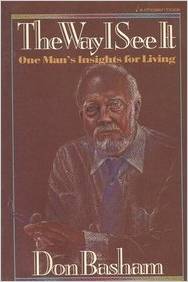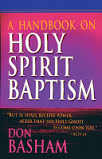The Holy Spirit, The Missing Finger: Comparing the Pneumatology of Alexander Campbell and Don Basham
Charismatic Renewal—Don Basham

Don Basham’s The Way I See It, published in 1987 by Chosen Books.
In the 1960’s Dennis Bennett became the icon of a movement of the Spirit that was known as the charismatic renewal. The work of the Spirit operated in an ecumenical course in the historic mainline protestant denominations, including the Christian Church (Disciples of Christ). One minister who became prominent and controversial was Don Basham. Attending the Campbellite-based school, Phillips University in Enid Oklahoma, Basham was ordained in the CC/DOC in 1955.[24] After receiving the baptism in the Holy Spirit, his traditional ministry changed. He prayed for demons to be cast out of members of his church. Many people believed his unconventional ministry was unbiblical. David du Plessis argued against exorcism since the cross of Christ was victorious over evil. On the other side, Don Basham provided an example of exorcism and the successful cure of someone who did not respond to conventional treatment.”[25]
In his helpful book, A Handbook on Holy Spirit Baptism, Basham answered relevant and honest questions for those interested about how the baptism in the Holy Spirit functions in the practical Christian life. Numerous inquiries about tongues and the Spirit’s work were deciphered, with thoughtful analysis. He wrote “this second experience of the power of God, which we call the baptism in the Holy Spirit, is given for the purpose of equipping the Christian with God’s power for service. It is the spiritual baptism for Jesus Himself, in which He begins to exercise His sovereign possession, control and use of us in supernatural fashion.”[26]
Though Basham was a Disciples of Christ minister, he was also a classical Pentecostal in his theology. He placed tongues in a paramount place in the experience of the Christian and was not ashamed to announce that “speaking in tongues” should be normative for the believer. He taught, “the only clear scriptural evidence of the baptism in the Holy Spirit is speaking in tongues.”[27] He did not evade the tongues experience but highlighted that Acts 2, 10, 19 support evidence for this theological belief. He discovered both power for service and anointing to minister over evil through the baptism. He emphatically wrote, (his emphasis in capital letters) “SOMETHING IS MISSING IN YOUR SPIRITUAL LIFE IF YOU HAVE RECEIVED THE HOLY SPIRIT YET HAVE NOT SPOKEN IN TONGUES.”[28] Thus, tongues was an essential for Christian living. Without tongues, one does not have access to God’s thoughts (1 Cor. 14:2). Basham proclaimed, “stated in the simplest way: man does the speaking while the Holy Spirit furnished the words.”[29] Certainly, tongues as the initial evidence was the beginning and foundation for his ministry in exorcism and casting out demons.
 A sequel to his first writing on Holy Spirit baptism was another question and answer book titled A Handbook on Tongues, Interpretation and Prophecy. He specifically dealt with the spiritual gifts of tongues and interpretation in I Corinthians 12 and 14. The basis for the book encouraged Paul’s exhortation to “not quench the Spirit” (1 Thess. 5:19, NIV). Additionally, he promoted Paul’s teaching to “be eager to prophesy, and do not forbid speaking in tongues. But everything should be done in a fitting and orderly way” (1 Cor. 14:39-40, NIV). The natural cohort to glossolalia was interpretation of tongues. “The gift of ‘interpretation of tongues’ is the companion gift to the gift of tongues. The two cannot function properly without the other.”[30] Basham related several stories through his numerous books of tongues and interpretation in his church ministry. In addition, he added that prophecy is more edification than predicting the future. He wrote, “our national preoccupation with astrology, fortune-telling, spiritualism and the popularity of clairvoyants like Jean Dixon and Edgar Cayce have urged many Christians into a morbid desire to peek into the future.”[31] This profound revelation demonstrated both the care and balance Basham took in these specific spiritual gifts. As Paul penned “anyone who speaks in a tongue edifies themselves, but the one who prophesies edifies the church” (1 Cor. 14:4). Basham likewise sought wise council in the apostle’s sage advice.
A sequel to his first writing on Holy Spirit baptism was another question and answer book titled A Handbook on Tongues, Interpretation and Prophecy. He specifically dealt with the spiritual gifts of tongues and interpretation in I Corinthians 12 and 14. The basis for the book encouraged Paul’s exhortation to “not quench the Spirit” (1 Thess. 5:19, NIV). Additionally, he promoted Paul’s teaching to “be eager to prophesy, and do not forbid speaking in tongues. But everything should be done in a fitting and orderly way” (1 Cor. 14:39-40, NIV). The natural cohort to glossolalia was interpretation of tongues. “The gift of ‘interpretation of tongues’ is the companion gift to the gift of tongues. The two cannot function properly without the other.”[30] Basham related several stories through his numerous books of tongues and interpretation in his church ministry. In addition, he added that prophecy is more edification than predicting the future. He wrote, “our national preoccupation with astrology, fortune-telling, spiritualism and the popularity of clairvoyants like Jean Dixon and Edgar Cayce have urged many Christians into a morbid desire to peek into the future.”[31] This profound revelation demonstrated both the care and balance Basham took in these specific spiritual gifts. As Paul penned “anyone who speaks in a tongue edifies themselves, but the one who prophesies edifies the church” (1 Cor. 14:4). Basham likewise sought wise council in the apostle’s sage advice.
Don Basham: To miss speaking in tongues is to miss God’s miraculous provision enabling you to pray with supernatural effectiveness.
Category: Church History, Winter 2015


